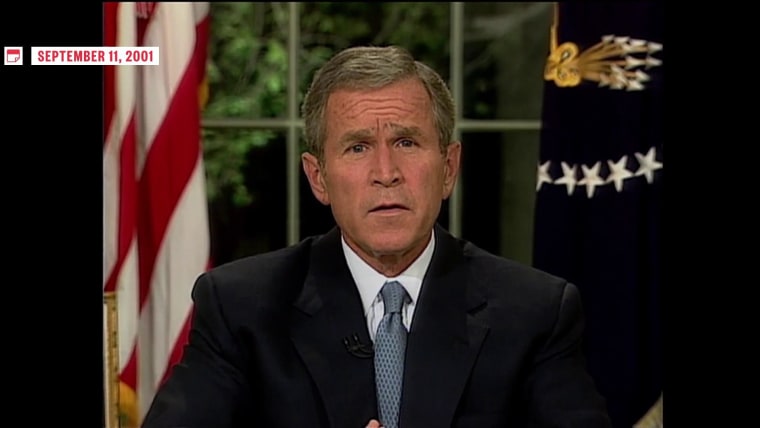On Sept. 11, 2001, I was a junior communications aide in George W. Bush’s White House. It was my first full-time job; I was barely old enough to buy a beer.
That morning, with America under attack, my colleagues and I were evacuated from the White House. We ran through Lafayette Square, across Pennsylvania Avenue. In the afternoon, after rallying in a makeshift office downtown, my roommate and I were sent walking through the empty streets of downtown Washington to FBI headquarters to assist with a media briefing. We rode with our boss back to an eerily quiet White House and worked with a news crew to set up the Oval Office for the president’s address to the nation.
We were in the Oval Office when the president walked in from Marine One on the South Lawn. As he rehearsed his speech, I was struck by his resolve.
I sat behind the president’s Resolute Desk as his stand-in and read through his remarks, imagining the momentous decisions he would have to make in that chair in the coming weeks.
We were in the Oval Office when the president walked in from Marine One on the South Lawn. As he rehearsed his speech, I was struck by his resolve and focus, the intensity in his eyes. The nation needed to see strength but also needed reassurance that we would be OK, that we would make it through the crisis and build back better.
In the coming days, Bush would bring the nation together in prayer at the National Cathedral and visit a mosque in solidarity with Muslim Americans. Believing a second-wave attack on the White House to be imminent, the Secret Service would take the president down to the White House “bunker” multiple times.
This year, on Sept. 11, 2020, our nation faces multiple crises simultaneously. But behind the Resolute Desk in the Oval Office, we have a man incapable of resolve, incapable of focus, incapable of strength, incapable of reassurance.
In Lafayette Square, the same place we were evacuated to 19 years ago, armed agents were sent to attack American civilians with gas and rubber bullets. With that gas still hanging in the air, President Donald Trump emerged from the White House to march through the park to another national church — not for prayer or to urge national unity but for a photo op.
Around the time I walked to the J. Edgar Hoover FBI Building on this fateful day in 2001, Donald Trump bragged in a live interview that with the Twin Towers in smoldering ruins, he was now the owner of the tallest building in lower Manhattan. He lamented the loss of the skyline but spared little sympathy for the loss of human life.
Today, after millions of Americans have fallen ill and almost 200,000 people have died, Trump again seems more focused on damage control and his personal finances than helping regular people. We now know that Trump knew the danger we faced with COVID-19 but intentionally played it down. More than 55 million Americans have sought unemployment benefits, and countless small businesses are failing, yet Trump spent valuable time trying to push through $1.75 billion in relief funds for a gleaming new FBI building across the street from his Trump International Hotel.
Americans don’t expect our presidents to be perfect; we know they will make mistakes. But they do expect our leaders to work to ease tensions and calm fears and to be honest about the challenges we face. Instead of bringing us together, addressing racial injustice and presenting a national strategy to stop the spread of the virus, Trump has intentionally sowed division, encouraged white nationalists and vigilantes while downplaying the threats they pose to society, stoked fear and spread misinformation with dangerous consequences.
9/11 wasn’t just an attack on American citizens; it was an attack on the very idea of American democracy. That democracy is under attack again today.
Around 1,000 are dying every single day from COVID-19 in the U.S. That means every three days, this nation is experiencing a 9/11-level loss of life under Trump’s “reign.”
9/11 wasn’t just an attack on American citizens; it was an attack on the very idea of American democracy. That democracy is under attack again today, not just from a foreign adversary (Russia) or a foreign-born virus (COVID-19) but from behind the very desk where presidents since Rutherford B. Hayes have made life-and-death decisions.
Donald Trump represents an existential threat to our Constitution, our security and our health. That’s why hundreds of my fellow former Bush administration officials have openly pledged to support his Democratic opponent in November.
You don’t need to support the full Joe Biden-Kamala Harris agenda; I don’t. But the nation cannot survive another four years of Donald Trump’s chaos, corruption, incompetence and lies. On Nov. 3, or earlier if you vote by mail, I urge you to vote for the only candidate who will help this nation to heal.
Our nation will not be safe until Joe Biden sits behind the Resolute Desk.











